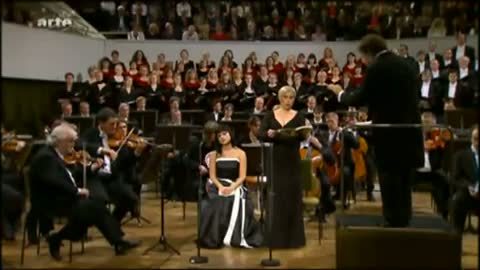You may remember in some of my previous blogs of Fellini's "And the Ship Sails On," there were a couple of references to Agnus Dei from Rossini's "Petite Messe Solennelle," here and here. (Remember, these older blogs will not play on Apple's devices that do not support Flash.) I felt it incomplete to leave that work without returning to it today. I am far from being religious, but many if not all of the great composers wrote divine music especially for religion, and one cannot escape the reality that it is an integral part of life. Here is a complete performance (length 7 minutes 13 seconds) of Rossini's Agnus Dei. Listening to this kind of music, don't you wonder what the singing is about? I do! Without appropriate background, it will be tough to know what the words say... so I did my homework just to satisfy my curiosity... and you can read about it here:
From this, I plagiarized the following..."In Liturgy, Agnus Dei is a name given to the formula recited thrice by the priest at Mass (except on Good Friday and Holy Saturday) in the Roman rite. It occurs towards the end of the Canon, after the prayer "Haec commixtio", etc. Having finished saying this prayer, the priest covers the chalice with the pall, genuflects, rises, inclines his head (but not his body) profoundly towards the altar and, with hands joined before his breast (and not, therefore, resting on the altar), says with a loud voice: "Agnus Dei, qui tollis peccata mundi, miserere nobis" (Lamb of God, Who takest away the sins of the world, have mercy on us), repeats the formula unchanged, and still a third time, substituting now "dona nobis pacem" (grant us peace) for "miserere nobis", meanwhile striking his breast thrice, once at each "miserere nobis" and once at "Dona nobis pacem", with the right hand (the left hand resting throughout, from the first "Miserere", on the altar)."
Now listen to the mezzo-soprano Manuela Custer (born in Novara, received her diploma from the "Giuseppe Verdi" Conservatory in Turin under the guidance of Elio Battaglia. She made her debut in 1985 as ENRICO in Rossini's Elisabetta, Regina d'Inghilterra with Lella Cuberli, Rockwell Blake, and Daniela Dessì, conducted by Gabriele Ferro,) and the choir, that's what they are singing. I am not sure why they cannot memorize these lyrics and have the need to each carry the pages that they hold in front of them. The words are not that complicated admittedly it's Latin. I am sure I can remember this if I were paid to sing this in a choir... but they will have to pay me handsomely! A king's ransom would do!




No comments:
Post a Comment